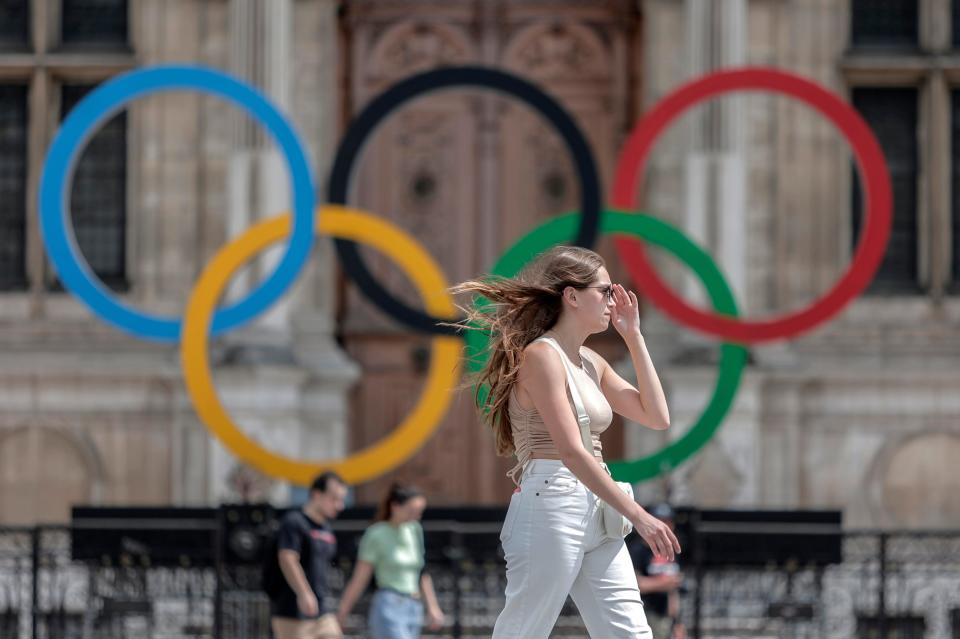Opposition to participation of Russian athletes at Paris Olympics continues to grow
The pressure is mounting to keep Russian athletes out of the Olympic Games until the war in Ukraine ends.
The Nordic Olympic committees issued a statement Tuesday saying “now is not the right time” to consider allowing athletes from Russia and Belarus to compete at the Olympic Games. Also Tuesday, the mayor of Paris said she is opposed to having athletes from those two countries at the Paris Olympics if the war is still ongoing next summer, reversing her earlier position.
The objections follow a statement last week from the prime ministers of three Baltic nations that suggested a boycott was possible if the International Olympic Committee went ahead with plans to allow athletes from Russia and Belarus to compete independently.

NEVER MISS A MOMENT: Sign up for our Sports newsletter to get daily updates in your inbox
“For as long as this war goes on, this Russian aggression on Ukraine, it’s not possible to parade as if nothing was happening, to have a delegation arriving in Paris, while bombs are raining on Ukraine,” Paris mayor Anne Hidalgo said during an interview with France Info, a French radio station.
What’s the backstory?
Russia and Belarus were banned by the IOC last year after Russia invaded Ukraine without provocation. But under president Thomas Bach, the IOC has shown a repeated lack of will for holding Russia accountable for bad behavior that included a state-sponsored doping scandal and flouting the resulting sanctions.
Sure enough, the IOC said last month it wanted to explore ways to allow athletes from Russia and Belarus to compete under a neutral flag.
The IOC says it is unfair to discriminate against the athletes because of their passports, though that’s exactly what the organization did when it banned South African athletes from 1964 to 1988 because of that country’s racist system of apartheid. The IOC also said it has no basis to continue the ban on athletes because there are no U.N. sanctions on either country, ignoring the fact that, as a permanent member of the Security Council, Russia can and has vetoed attempts at sanctions.
But the backlash was swift, with an aide to Ukrainian president Vlodomor Zelenskyy calling the IOC a “promoter of war, murder and destruction.”
Why is Ukraine opposed to Russia and Belarus’ return?
Aside from the obvious? Ukraine says it is impossible for athletes from Russia and Belarus to be considered “neutral” when their countries are waging a war that has left thousands of Ukrainians dead and many more homeless. Parts of the country have been without power throughout much of the winter because of indiscriminate Russian shelling.
The IOC said it would only allow athletes who have not publicly supported the war efforts, but has not said how that will be determined. Many Russian athletes are officers in the Russian army or are members of teams associated with the military, and some have made appearances either in uniform or with their medals at “patriotic” celebrations.
Zelenskyy also points out that training is difficult for Ukrainian athletes because the entire country is, effectively, a war zone.
What’s next?
The IOC has not taken criticism of its plan well, saying a boycott would be a violation of the Olympic Charter. But so, too, is an unprovoked war, and it’s clear the sympathies of Olympic officials in Europe are with Ukraine.
"The situation with the war in Ukraine has not changed," the Nordic officials wrote Tuesday. "Therefore, we stand firm in our position, not to open for Russian and Belarusian athletes and officials in international sports participation. Now is not the right time to consider their return; that is our position."
There could be more opposition still to come, too. Britain is organizing a meeting Friday of sports ministers from more than three dozen European countries to discuss the IOC’s plan and what the response should be.
It’s one thing for the IOC to ignore criticism from smaller nations like Latvia or Poland. But if the major European powers come out in support of Ukraine, or French president Emmanuel Macron joins Hidalgo, the IOC could find itself backed into a corner.
This article originally appeared on USA TODAY: Opposition grows to IOC plan to let Russia compete at Paris Olympics

